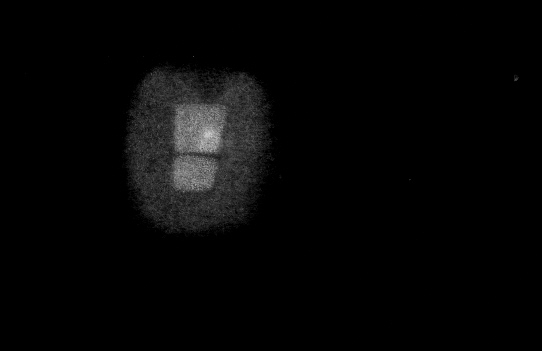
Observer: Mark G.Birkmann
Your skills: Intermediate (some years)
Date/time of observation: 9-4-2000, 5:45 UT (12:45 CDT)
Location of site: New Haven, Missouri (Lat ~38, Elev ~700 feet)
Site classification: Rural
Sky darkness: 4 <1-10 Scale (10 best)>
Seeing: 4, sometimes 6 <1-10 Seeing Scale (10 best)>
Moon presence: None - moon not in sky
Instrument: 40" f/5 dob
Magnification: 408x, 858x
Filter(s): none
Category: Planetary nebula.
Class: 3a
Constellation: Cygnus
Data: mag 10.4(p) size 14", central star mag 16.2
Position: RA 21h:07m 1.7s DEC +42:14' 10"
Description:
This little planetary is a fascinating object.
The best view was at high power, 858x using a 6.7mm meade uwa and paracorr.
The color was blue gray and the central star was not seen. The nebula
was roughly rectangular with a dark lane running through the short dimension
a little more than halfway down from the top. The northeast and southeast
corners appeared to be right angles. The northwest corner was a little
less than 90 degrees so that the west side sloped inward slightly from
top to bottom. These two sections were equal in brightness except
for a bright knot of nebulosity in the top section. The knot was
about 3/5 of the way down from the top of the top section on the west side.
The nebulosity around this bright knot was also slightly brighter to the
western edge of the nebula and to the south ending at the dark lane.
The dark lane appeared to widen to the south of the bright knot but this
could have been an illusion due to the difference in brightness on either
side of the dark lane on this side of the nebula. There was a hint
of a surrounding envelope of nebulosity and this was confirmed with the
24.5mm meade swa and 2x barlow for a power of 408x. At this power
the nebula was blue green and the outer envelpe was seen all the way around
the nebula. On the northwest side of the nebula, however, the outer
envelope was very faint and this dark area widened as the distance from
the nebula increased as though this part of the nebula was shaded from
the central star. The 13.7 mag star gsc 3176:242 was seen 43" to
the west. In this drawing north is up and a little to the left.